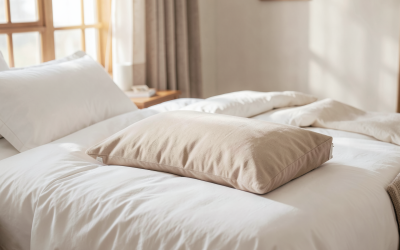Meditation has a wide range of benefits, from reducing stress to improving mental clarity. As a result, many people are turning to mindfulness practices as part of their daily routine. One of the most important elements of successful meditation is finding a comfortable position in which to focus. Though it may seem counterintuitive, many experienced meditators rely on pillows to support their practice.
Benefits of Using a Pillow for Meditation
Using a pillow can help you maintain the correct posture when meditating. This can be especially important if you have back, neck, or joint pain, as some more challenging meditation poses can be uncomfortable. By using a pillow, you can find ergonomic support to help you stay upright but comfortable throughout your practice. Pillows can also provide comfort and grounding by elevating the hips and providing a soft sitting surface.
In addition, using a pillow can help to reduce distractions during meditation. The cushioning of the pillow can help to absorb any external noises, allowing you to focus more easily on your practice. The pillow can also provide a sense of security and stability, allowing you to relax more deeply into your meditation.
Different Types of Pillows for Meditation
There is a wide variety of pillows available specifically designed for meditation. The most common type is the zafu cushion, which is traditionally filled with buckwheat husks and provides firm, supportive cushioning. Other popular pillows include the bolster, which wraps around the back, and the triangle block, which helps to keep the upper body straight. Additionally, some people prefer to use regular pillows stuffed with cotton or polyfill.
How to Choose the Right Pillow for Meditation
It is important to choose the right pillow for your meditation practice in order to ensure optimal comfort and support. The best way to choose a pillow is to try out different types and do your research. Consider factors such as cushioning and firmness, as well as how easy it is to move and adjust the pillow. Make sure the pillow is large enough that your legs can fit comfortably when your knees are bent.
Tips for Using a Pillow During Meditation
Using a pillow while meditating can enhance your experience if done correctly. A few tips to get the most out of your meditation practice with a pillow include:
- Sit in an upright but relaxed position.
- Place the pillow at an angle, with your spine and head naturally supported.
- Place your hands on your thighs or belly.
- Use visual imagery and mentally scan your body to encourage relaxation.
- Focus on your breath for a few minutes at a time.
Does Size Matter When Choosing a Meditation Pillow?
The size of your pillow should be based on your individual needs. It should be large enough so that your legs can fit comfortably when kneeling or cross-legged and long enough to allow you to sit upright but relaxed. Some pillows are adjustable, so you can adjust their thickness for optimal comfort.
What to Look for in a Quality Meditation Pillow
When choosing a pillow for meditation, there are several factors to consider. First and foremost, look for one made with top-quality materials that provide comfort and support. Additionally, look for pillows designed with breathable fabric, such as cotton or bamboo, which will help to regulate temperature. Additionally, look for pillows that are easy to care for and maintain.
Tips for Cleaning and Maintaining Your Meditation Pillow
It’s important to take proper care of your meditation pillow in order to get the most out of it. To clean it, first remove any loose fibers or dust. Then vacuum or brush the pillow gently. Make sure not to get it wet or put it in the washing machine. Finally, store the pillow in a cool and dry place when not in use.
Alternatives to Using a Pillow for Meditation
There are many alternative methods for practicing meditation. Common alternatives include sitting on a chair or the floor without any support. For those who prefer a more active method, there are several techniques that involve movement such as walking or Tai Chi. Additionally, some meditators prefer using meditation stools or inflatable mattresses.
Conclusion
Using a pillow for meditation can provide ergonomic support and comfort, helping you stay focused and improve overall wellbeing. When choosing a pillow, there are several factors to consider including cushioning and firmness, size, and breathability. Remember to take care of your pillow and store it in a cool dry place when not in use. Ultimately, the right meditation pillow will help you get the most out of your practice.



